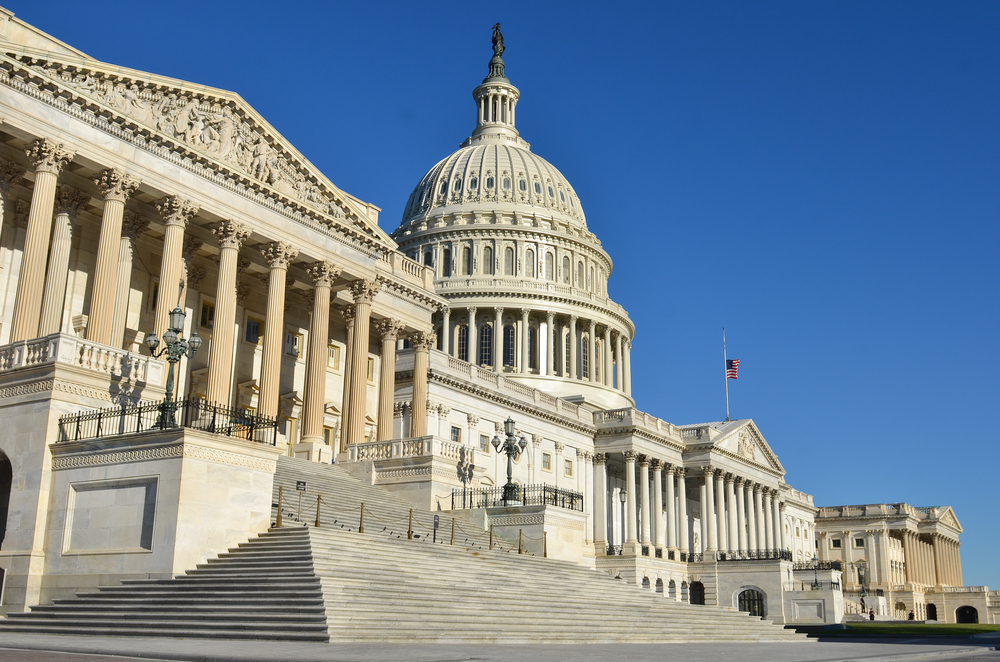In its latest report, the Committee for a Responsible Federal Budget warns national debt is currently higher than at any time in history outside of World War II and the years immediately after, and it is rising unsustainably. Moreover, recent tax and spending legislation have made a bad situation even worse.
The Committee for a Responsible Federal Budget (CRFB) is an independent, non-profit, bipartisan public policy organization based in Washington, D.C. that addresses federal budget and fiscal issues. CRFB focuses on many issues including deficit reduction, “entitlement” reform, fundamental tax reform, improving the budget process, and other topical issues as they arise. Mediabiasfactcheck.com rates the factual reporting of the organization as “very high.”
CRFB’s projections show that under current law, trillion-dollar deficits will return permanently by next year and debt will exceed the size of the economy within a decade.
| 2018 | 2020 | 2022 | 2024 | 2028 | |
| Current Law Estimate | |||||
| Social Security | $988 | $1,114 | $1,257 | $1,413 | $1,769 |
| Health Care | $1,073 | $1,227 | $1,407 | $1,515 | $2,027 |
| Other Mandatory | $516 | $590 | $638 | $624 | $718 |
| Discretionary | $1,280 | $1,371 | $1,396 | $1,452 | $1,616 |
| Interest | $309 | $448 | $584 | $717 | $963 |
| Total Spending | $4,167 | $4,750 | $5,281 | $5,721 | $7,093 |
| Revenue | $3,414 | $3,638 | $4,019 | $4,453 | $5,420 |
| Deficit | $753 | $1,113 | $1,262 | $1,268 | $1,673 |
| Debt | $15,727 | $18,075 | $20,586 | $23,198 | $29,437 |
| GDP | $20,236 | $21,679 | $23,278 | $25,187 | $29,231 |
CRFB’s Conclusions:
Much has changed since CBO last published its budget and economic projections in June of last year, but much has also stayed the same. Debt remains at post-war record high levels, structural deficits remain large, and entitlement programs are slated to grow at an unsustainable pace as the population continues to age.
Yet legislation enacted since June 2017 has turned a dismal fiscal situation into a dire one. Revenue is lower, spending is higher, deficits are larger, and the national debt is rapidly headed toward a new record. To make matters worse, the pressure for policymakers to further increase deficits through various policy extensions has intensified.
Importantly, these projections also do not supplant the need for CBO’s thorough budget outlook scheduled to be released in April. CBO does a much more rigorous analysis than we are able to with access to crucial data and sophisticated modeling. We merely seek to inform the conversation until CBO has a chance to release its full report.
A year ago, paying for new legislation and securing the solvency of various trust funds would have been sufficient to prevent debt from rising rapidly as a share of GDP. Unfortunately, lawmakers chose instead to ignore impending trust fund insolvencies and charge significant new tax cuts and spending hikes to the national credit card.
The complete disregard for budgetary constraints that lawmakers have shown in the past year – and in the past few years before that as well – have largely undone the progress made on deficits earlier in the decade.
As a result, an aggressive combination of spending reductions, revenue increases, and entitlement reform will be needed. Hopefully, lawmakers will quickly re-focus on deficit reduction to prevent debt from reaching unprecedented levels.
Read the paper.
